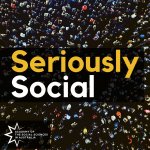Learning Pythagoras’ theorem, reading the work of Shakespeare, and studying the battles of World War I are all standard lessons in Australian schools. But is this enough?
Leading expert in education, and Chancellor of Western Sydney University, Professor Peter Shergold, says no. He is concerned about the future of Australian democracy, saying that because so much of what we see online is fed to us by algorithms (after all, one probably sent you to this story, right?), educational institutions need to work harder to focus on the right lessons.
“I think what a university must give [to students] is the capacity to be able to hear two sides of an argument and make your own views,” says Professor Shergold.
Learn how to think. Learn how to collaborate. Learn how to problem solve. Do all that and Professor Shergold believes you’ll have the smarts to engage in two-sided discussions rather than seeing life in the black and white positions often fed to us on our social feeds.
Are we there yet? Not according to Professor Shergold. He fears that in most types of learning institutions crucial life skills like “creative thinking, complex problem solving, collaborative teamwork, [and the] ability to work on your own” are being taught indirectly at best, with the primary focus on retaining content (say to pass a test).
Professor Shergold also says our educational institutions need to turn out students who are both equipped for the workforce, as well as having the skills to engage in our democratic systems as “active citizens” who can make their own voices heard in a cluttered public domain.
For him, the algorithms and where they are directing our attention on a daily basis is crucial. The problem is that tomorrow’s leaders are spending much of their days online, where they are fed only “voices that largely reflect their own world view” and tribal politics can rapidly amplify.
Outside the classroom, every time we read a news story via a social media platform (yes, even this one!), Professor Shergold believes we should always remember these spaces are being guided by data. The minute we forget that, he says, is the minute we lose our hold on protecting our democracy.
In his own social feeds, Professor Shergold tries to even the field by “purposely subscrib[ing] to the Guardian and to President Trump’s daily tweets just to try and confuse the algorithms, who think they will then know the political views I want to hear.”
But while tactics like these may help you outsmart the algorithms, it’s those skills taught in our educational institutions that will help you problem solve your way through these types of issues. If we long for a country of ‘active citizens’, or you want to make sure you remain one of them, remember Professor Shergold’s earlier advice: make sure your educational institution is helping you build the skill of hearing two sides of an argument so you can form your own views.

